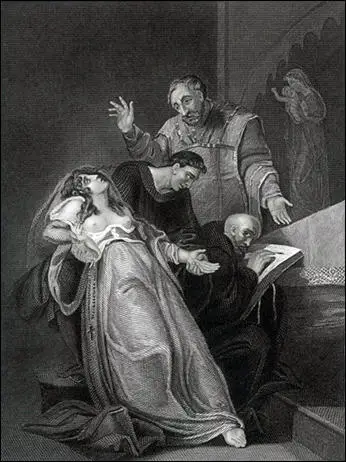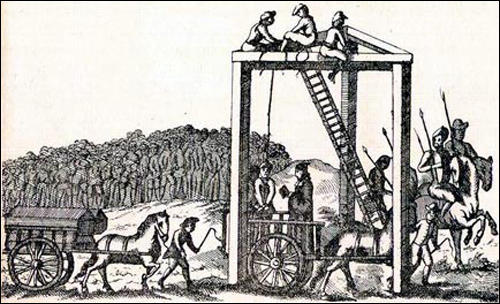Elizabeth Barton and Henry VIII
Elizabeth Barton was born in about 1506. Very little is known about her early life or family. Barton is unlikely to have received any sort of formal education during her childhood, and she was almost certainly illiterate. In 1525 she was a servant in the household of a certain Thomas Cobb, farm manager to Archbishop William Warham, at Goldwell House in the village of Aldington, some 20 miles from Canterbury.
Barton began to suffer from an unknown ailment. A friend, Edward Thwaites, later reported that in 1525 she became seriously ill. During this period of sickness and delirium she began to demonstrate supernatural abilities. This included predicting the death of a child. During her trances she made "various pronouncements on matters of religion, such as the seven deadly sins, the ten commandments, and the nature of heaven, hell, and purgatory."
In 1526 she entered St Sepulchre's Nunnery. Elizabeth had meetings with Edward Bocking, a monk at Christchurch Priory. According to contemporary sources a crowd of about 3,000 people attended one of the meetings where she told of her visions. As her fame spread she had meetings with Cardinal Thomas Wolsey, Archbishop William Warham, Bishop John Fisher and Thomas More.
Primary Sources

(Source 2) Edward Thwaites, A Marvellous Work of Late Done at Court-of-Street (1527)
About the time of Easter, in the seventeenth year of the reign of Henry VIII, it happened a certain maiden named Elizabeth Barton... to be touched with a great infirmity in her body, which did ascend at diverse times up into her throat, and swelled greatly, during the time whereof she seemed to be in grievous pain, in so much as a man would have thought that she had suffered the pangs of death itself, until the disease descended and fell down into the body again.
Thus she continued by fits the space of seven months and more, and at the last, in the month of November (at which time a young child of her master's lay desperately sick in a cradle by her) she, being vexed with the former disease, asked (with great pangs and groaning) whether the child were yet departed this life or no; and when the women that attended upon them both in their sickness answered no, she replied that it should anon. Which word was no sooner uttered, but the child fetched a great sigh and withal the soul departed out of the body of it.
(Source 3) Diane Watt, Elizabeth Barton : Oxford Dictionary of National Biography (2004-2014)
In the course of this period of sickness and delirium she began to demonstrate supernatural abilities, predicting the death of a child being nursed in a neighbouring bed. In the following weeks and months the condition from which she suffered, which may have been a form of epilepsy, manifested itself in seizures (both her body and her face became contorted), alternating with periods of paralysis. During her death-like trances she made various pronouncements on matters of religion, such as the seven deadly sins, the ten commandments, and the nature of heaven, hell, and purgatory. She spoke about the importance of the mass, pilgrimage, confession to priests, and prayer to the Virgin and the saints.
(Source 4) Thomas Cranmer, letter to Hugh Jenkyns describing seeing Elizabeth Barton in 1526.
It was a great miracle... that had been wrought in a maid by the power of God and our Lady... Her trance lasted... the space of three hours and more... Her face was wonderfully disfigured, her tongue hanging out... her eyes were... in a manner plucked out and laid upon her cheeks... a voice was heard... speaking within her belly, as it had been in a cask... her lips not greatly moving.... When her belly spoke about the joys of heaven... it was in a voice... so sweetly and so heavenly that every man was ravished with the hearing thereof... When she spoke of hell... it put the hearers in great fear.
(Source 5) Official record of the meeting between Henry VIII and Elizabeth Barton (October 1532)
She (Elizabeth Barton) had knowledge by revelation from God that God was highly displeased with our said Sovereign Lord (Henry VIII)... and in case he desisted not from his proceedings in the said divorce and separation but pursued the same and married again, that then within one month after such marriage he should no longer be king of this realm, and in the reputation of Almighty God should not be king one day nor one hour, and that he should die a villain's death, saying further that there was a root with three branches, and until they were plucked up it should never be merry in England, interpreting the root to be the late Lord Cardinal (Wolsey), and the first branch to be the king, our Sovereign Lord, the second the duke of Norfolk, (Thomas Howard) and the third to be the duke of Suffolk (Charles Brandon).
(Source 6) Eustace Chapuys, report to King Charles V (12th November, 1533)
The king has assembled the principal judges and many prelates and nobles, who have been employed three days, from morning to night, to consult on the crimes and superstitions of the nun and her adherents... The chancellor proceeding to say that the nun and her accomplices in her detestable malice, desiring to incite the people to rebellion, had spread abroad and written that she had a divine revelation that the king would soon be shamefully driven from his kingdom by his own subjects, some of them began to murmur and cry that she merited the fire.
(Source 7) Elizabeth Barton, confession (23rd November, 1533)
I, Dame Elizabeth Barton, do confess that I, most miserable and wretched person, have been the original of all this mischief, and by my falsehood have grievously deceived all these persons here and many more, whereby I have most grievously offended Almighty God and my most noble sovereign, the King's Grace.
Wherefore I humbly, and with heart most sorrowful, desire you to pray to Almighty God for my miserable sins and, ye that may do me good, to make supplication to my most noble sovereign for me for his gracious mercy and pardon.
(Source 8) Eustace Chapuys, report to King Charles V (24th November, 1533)
It is said on the two next Sundays the nun and the above - mentioned persons will play the same part, and that afterwards they will be taken through all the towns in the kingdom to make a similar representation, in order to efface the general impression of the nun's sanctity, because this people is peculiarly credulous and is easily moved to insurrection by prophecies, and in its present disposition is glad to hear any to the king's disadvantage.
(Source 9) Elizabeth Barton, speech on scaffold (20th April, 1534)
I have not been the cause of my own death, which most justly I have deserved, but also I am the cause of the death of all these persons which at this time here suffer. And yet, to say the truth, I am not so much to be blamed considering it was well known unto these learned men that I was a poor wench without learning - and therefore they might have easily perceived that the things that were done by me could not proceed in no such sort, but their capacities and learning could right well judge from whence they proceeded... But because the things which I feigned was profitable unto them, therefore they much praised me... and that it was the Holy Ghost and not I that did them. And then I, being puffed up with their praises, feel into a certain pride and foolish fantasy with myself.

(Source 11) John Husee, diary entry (20th April, 1534)
This day the Nun of Kent, with two Friars Observants, two monks, and one secular priest, were drawn from the Tower to Tyburn, and there hanged and headed. God, if it be his pleasure, have mercy on their souls. Also this day the most part of this City are sworn to the King and his legitimate issue by the Queen's Grace now had and hereafter to come, and so shall all the realm over be sworn in like manner.
Questions for Students
Question 1: Read the introduction and then explain what is happening in source 1.
Question 2: Study sources 2 and 3. What did Elizabeth Barton do in 1525 that convinced Edward Thwaites that she had supernatural powers because she could predict the future? Do you think Diane Watt agrees with Edward Thwaites that Barton has supernatural powers?
Question 3: Source 2 was written by someone who knew Elizabeth Barton. Source 3 was written nearly 500 years after her death. Does this mean the information in source 2 is more reliable and valuable than source 3?
Question 4: Read source 4. Do you think Thomas Cranmer believed that Elizabeth Barton was really communicating messages from God?
Question 5: In 1532 Henry VIII was in love with Anne Boleyn and was considering divorcing his wife Catherine of Aragon. Why was he so unhappy with what Elizabeth Barton told him (source 5)?
Question 5: What did Eustace Chapuys mean by the phrase that "she (Elizabeth Barton) merited the fire" (source 6)?
Question 6: How does source 8 help to explain why Elizabeth Barton was forced to make a public confession (source 7)?
Question 7: Study sources 9, 10 and 11. Compare their value as evidence in helping us understand why Elizabeth Barton was executed.
Answer Commentary
A commentary on these questions can be found here
Download Activity
You can download this activity in a word document here
You can download the answers in a word document here
